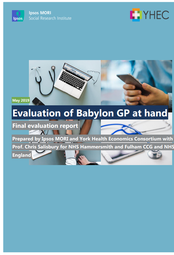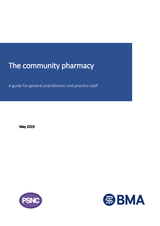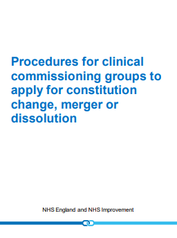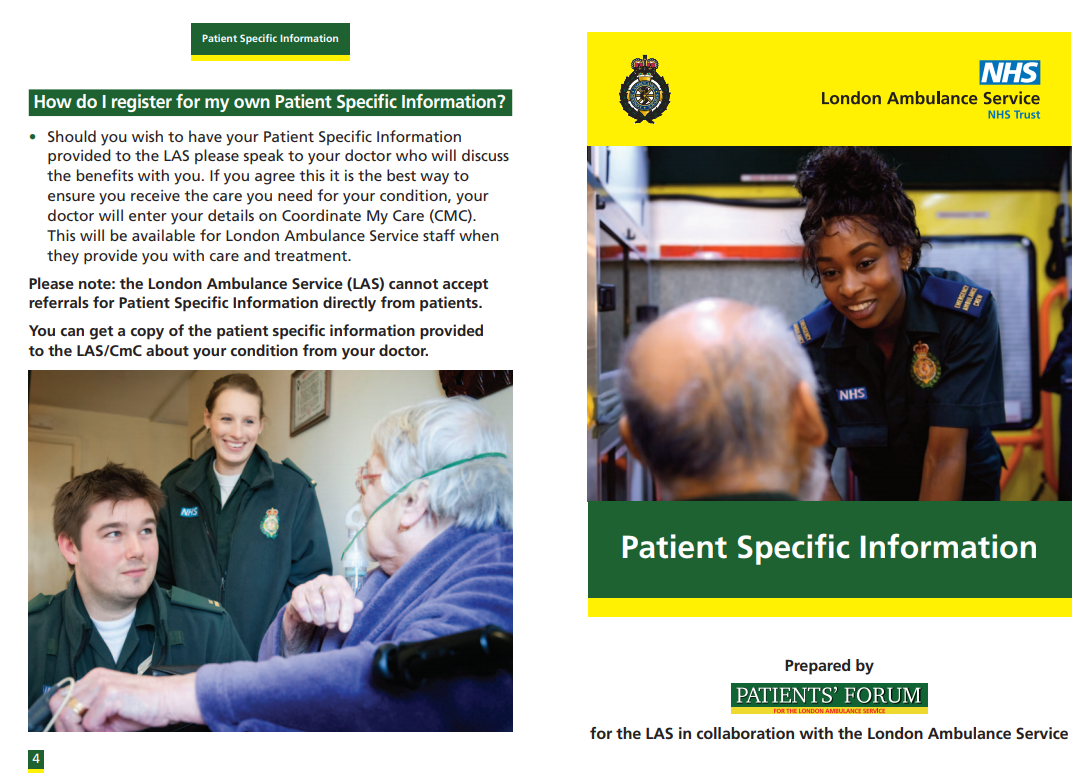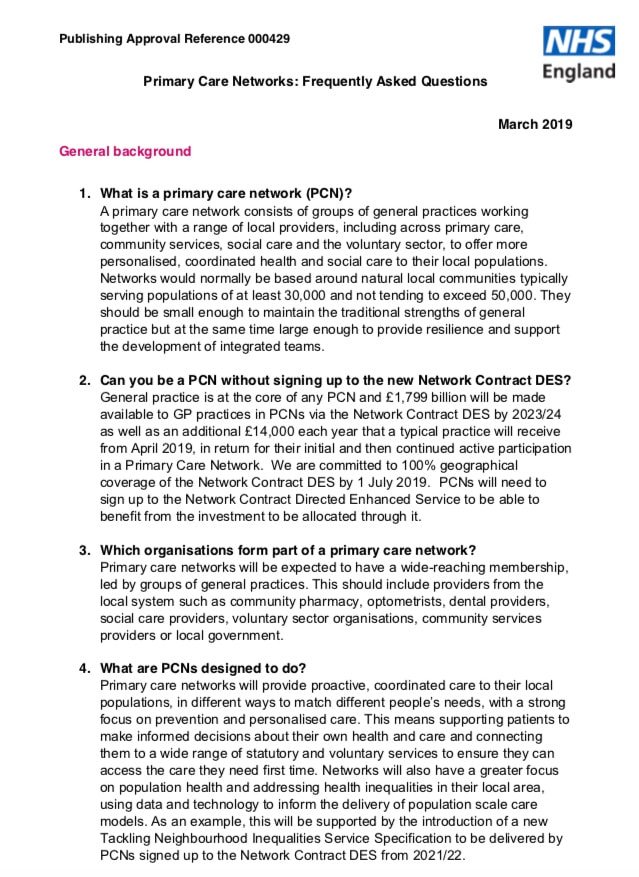NEWS ... MAY 2019
'ALL-SINGING AND ALL-DANCING' NHS APP SCRAPPED
May 2019 ... 1 page
NHSX’s new Chief Executive has scrapped plans for an “all-singing and all-dancing” NHS App, despite the long-term plan saying the app would be the NHS’ digital “front door”.
May 2019 ... 1 page
NHSX’s new Chief Executive has scrapped plans for an “all-singing and all-dancing” NHS App, despite the long-term plan saying the app would be the NHS’ digital “front door”.
PRIVATE FIRMS BANNED FROM 'LEAD PROVIDER' ROLE IN SPECIALISED MENTAL HEALTH SPHERE
30 May 2019 ... 2 pages
National leaders have banned private firms from leading new models of care for specialised mental health – following criticism of their involvement.
In a letter to all providers of specialised mental health, learning disability and autism services, NHS England states that only NHS organisations will be able to hold the contracts. Private providers are still expected to have involvement in projects, as they hold significant market share in these services.
30 May 2019 ... 2 pages
National leaders have banned private firms from leading new models of care for specialised mental health – following criticism of their involvement.
In a letter to all providers of specialised mental health, learning disability and autism services, NHS England states that only NHS organisations will be able to hold the contracts. Private providers are still expected to have involvement in projects, as they hold significant market share in these services.
|
EVALUATION OF BABYLON GP AT HAND
Report commissioned by NHS England Ipsos MORI was commissioned by NHS Hammersmith and Fulham Clinical Commissioning Group and NHS England in May 2018 to undertake an independent evaluation of Babylon - GP at Hand . -- this is a bit of a block buster, but if anyone wants it , go to: https://www.hammersmithfulhamccg.nhs.uk/media/156123/Evaluation-of-Babylon-GP-at-Hand-Final-Report.pdf |
|
THE COMMUNITY PHARMACY
A Guide for General Practitioners and Practice Staff This guide aims to support General Practitioners (GPs) and Community Pharmacists in developing more effective working relationships and in turn, improve primary care services for patients. It covers key areas such as funding arrangements for Pharmacies, the impact of prescribing policies and the range of clinical and administrative functions that Community Pharmacies currently provide. |
|
PROCEDURES FOR CLINICAL COMMISSIONING GROUPS TO APPLY FOR CONSTITUTION CHANGE, MERGER OR DISSOLUTION
18 pages Policy and procedures to be followed by Clinical Commissioning Groups (CCGs) and NHS England in the circumstances of a CCG wishing to apply to make changes to its Constitution, or to dissolve, or for two or more CCGs wishing to apply to merge. |
|
PATIENT SPECIFIC INFORMATION - Leaflet
Prepared by The Patients' Forum for the LAS in collaboration with the London Ambulance Service ... 4 pages Patient Specific Information (PSI) is intended to help patients have conversations with their GPs or other healthcare specialists to design care plans that meet patients’ special or high level needs, should they require urgent or emergency care from the London Ambulance Service. |
Patients who feel they would benefit from Patient Specific Information, should make an appointment to see their GP or specialist Doctor, to draw up a Care Plan that provides details of their health condition or special treatment needs.
This information can then be transferred to London Ambulance Service front-line clinical staff via the Co-ordinate My Care App, to enable them to give patients the right emergency or urgent care first time.
This information can then be transferred to London Ambulance Service front-line clinical staff via the Co-ordinate My Care App, to enable them to give patients the right emergency or urgent care first time.
|
PUBLIC ENGAGEMENT STRATEGIES AND EVALUATION
38 pages In the following report, Hanover Research surveys current research and practices in the evaluation of higher education public engagement strategies and initiatives. The first section provides an overview of public engagement in higher education before presenting some of the challenges to measurement and evaluation. The following section analyses various evaluation practices, concentrating on key performance indicators, methodologies, and bench-marking tools. The final section examines public engagement evaluation and strategy at five institutions in the United Kingdom and the United States. |
PRIMARY CARE NETWORKS: FREQUENTLY ASKED QUESTIONS
10 pages
A number of frequently asked questions about Primary Care Networks that have come through various engagement sessions. If your question is not listed below, you can send this to the Primary Care Network national team who will share a response [email protected]
10 pages
A number of frequently asked questions about Primary Care Networks that have come through various engagement sessions. If your question is not listed below, you can send this to the Primary Care Network national team who will share a response [email protected]
MY OF NHS EXPERTS BROUGHT IN TO CARE HOMES TO TACKLE OVER-MEDICATION
An army of experts has been recruited by NHS England as part of a package of measures to improve older people’s health and care in the NHS Long Term Plan and to help prevent care home residents being given too many medicines. Care home residents are prescribed an average of seven medicines a day, with many taking 10 or more, costing the NHS an estimated £250 million each year, with charities voicing fears that a generation of older people is being subjected to a ‘chemical cosh’.
The NHS is putting in place medical and clinical experts, including 200 new clinical pharmacists and pharmacy technicians, who will support care home residents to improve quality of life, cut hospital stays and reduce over-medication. They are working as part of a £20 million programme to reduce unnecessary medication of patients and make sure they are getting the right treatment that is being rolled out across the country.
The additional staff are being brought in alongside the national roll-out of a programme in the NHS Long Term Plan – and already in place in 14 parts of the country – giving everyone living in a care home improved GP support and more visits from specialists like dieticians and clinical pharmacists.
Around 400,000 people live in England’s 17,000 nursing and residential care homes with one in seven residents aged 85 or over. Elderly residents, in particular, often have one or more long-term health conditions – for example dementia, high blood pressure, diabetes and heart disease. They spend around two million days in hospital each year and account for about 250,000 emergency hospital admissions.
Some 35%-40% of these admissions are thought to be avoidable through action such as tackling over medication. The new programme will also help to reduce the number of visits to A&E caused by older patients’ medicine use – studies suggest one in 10 older people’s admissions to hospital is linked to their medicine intake, with the majority of these thought to be avoidable with better care and support.
An army of experts has been recruited by NHS England as part of a package of measures to improve older people’s health and care in the NHS Long Term Plan and to help prevent care home residents being given too many medicines. Care home residents are prescribed an average of seven medicines a day, with many taking 10 or more, costing the NHS an estimated £250 million each year, with charities voicing fears that a generation of older people is being subjected to a ‘chemical cosh’.
The NHS is putting in place medical and clinical experts, including 200 new clinical pharmacists and pharmacy technicians, who will support care home residents to improve quality of life, cut hospital stays and reduce over-medication. They are working as part of a £20 million programme to reduce unnecessary medication of patients and make sure they are getting the right treatment that is being rolled out across the country.
The additional staff are being brought in alongside the national roll-out of a programme in the NHS Long Term Plan – and already in place in 14 parts of the country – giving everyone living in a care home improved GP support and more visits from specialists like dieticians and clinical pharmacists.
Around 400,000 people live in England’s 17,000 nursing and residential care homes with one in seven residents aged 85 or over. Elderly residents, in particular, often have one or more long-term health conditions – for example dementia, high blood pressure, diabetes and heart disease. They spend around two million days in hospital each year and account for about 250,000 emergency hospital admissions.
Some 35%-40% of these admissions are thought to be avoidable through action such as tackling over medication. The new programme will also help to reduce the number of visits to A&E caused by older patients’ medicine use – studies suggest one in 10 older people’s admissions to hospital is linked to their medicine intake, with the majority of these thought to be avoidable with better care and support.
GP AT HAND - KEY REPORTS STILL DELAYED
GP leaders have called for the publication of two key reports on GP at Hand - branding delays to an impact assessment and the lack of an up-to-date CQC rating for the service 'irresponsible'.
- Last month, a report evaluating the impact of Babylon GP at Hand on patients, the primary care workforce and the wider healthcare system - conducted by market research firm Ipsos Mori - had been delayed.
- Pressure is also growing on the CQC to publish the findings from its latest GP at Hand inspection, which took place in January.
Despite the reports not yet being published, GP at Hand - which has a patient list size of almost 50,000 - has been granted permission to expand to Birmingham.
GP leaders have called for the publication of two key reports on GP at Hand - branding delays to an impact assessment and the lack of an up-to-date CQC rating for the service 'irresponsible'.
- Last month, a report evaluating the impact of Babylon GP at Hand on patients, the primary care workforce and the wider healthcare system - conducted by market research firm Ipsos Mori - had been delayed.
- Pressure is also growing on the CQC to publish the findings from its latest GP at Hand inspection, which took place in January.
Despite the reports not yet being published, GP at Hand - which has a patient list size of almost 50,000 - has been granted permission to expand to Birmingham.
|
PCN FAQ
Primary Care Networks, FAQs ... 1 pages https://www.england.nhs.uk/wp-content/uploads/2019/04/pcn-faqs-000429.pdf |
|
PCNs - DESs (Directed Enhanced Services)
Network Contract - Directed Enhanced Service [DES] Contract specification 2019/20 Superseded 4.4.4 Patient engagement |
a) GP member practices within the PCN [Primary Care Network] will have requirements relating to patient engagement under their primary medical services contracts. The PCN will therefore be expected to reflect those requirements by engaging, liaising and communicating with their collective registered population in the most appropriate way, informing and/or involving them in developing new services and changes related to service delivery. This includes engaging with a range of communities, including ‘seldom heard’ groups.
b) The PCN will be required to provide reasonable support and assistance to the commissioner in the performance of its duties to engage patients in the provision of and/or reconfiguration of services where applicable to the registered population.
https://www.england.nhs.uk/wp-content/uploads/2019/03/network-contract-des-specification-2019-20.pdf
-- see contents for: Clinical Pharmacists ... Social Prescribing link workers ... extended hours access, etc and Financial remuneration to Practices for take-up of each of these.
b) The PCN will be required to provide reasonable support and assistance to the commissioner in the performance of its duties to engage patients in the provision of and/or reconfiguration of services where applicable to the registered population.
https://www.england.nhs.uk/wp-content/uploads/2019/03/network-contract-des-specification-2019-20.pdf
-- see contents for: Clinical Pharmacists ... Social Prescribing link workers ... extended hours access, etc and Financial remuneration to Practices for take-up of each of these.

